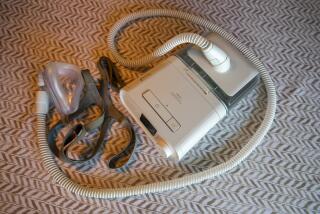Defibrillators may pose a dilemma
- Share via
Researchers toting up the pluses and minuses of implanting defibrillators in the chests of people with a potentially fatal heart defect said last week that the devices could save lives, but could also expose patients to deadly risks.
An estimated 500,000 Americans were born with a genetic heart defect that causes a condition called hypertrophic cardiomyopathy, or HCM, that can cause the heart to beat abnormally and damage the heart muscle. In up to 5% of cases, that can lead to a sudden, fatal heart attack, the researchers said. It is one of the most common causes of death in young people, including trained athletes.
In a global study of 506 patients described as “high risk” who had been implanted with defibrillators, one in five received shocks that likely saved their lives, according to author Dr. Barry Maron and colleagues at the Minneapolis Heart Institute Foundation.
An additional 27% of the patients received unnecessary shocks from their devices, while a number developed dangerous side effects: Nearly 4% suffered infections, 2% developed hemorrhaging or blood clots and 7% had mechanical problems with the device. One patient was killed by a faulty device.
“The device may not activate for up to 10 years, but when it does, it does,” Maron wrote in the July 25 issue of the Journal of the American Medical Assn.






